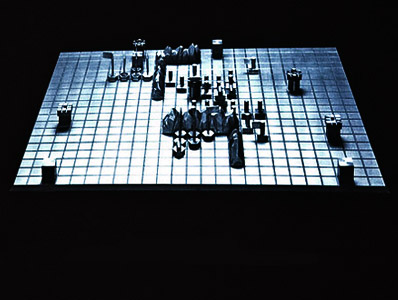
Auch. Just dug up some horrible stories from the (anti)copyright front.
The RSG collective, led by Alexander Galloway, NYU assistant professor, founding member of the Radical Software Group and author of the inspiring book ‘Protocol‘, has been working some years now on an online version of ‘Le Jeu de la Guerre’ (the Game of War), a board game created by Guy Debord in 1978. Described by McKenzie Wark as “a diagram of the strategic possibilities of spectacular time” inspired by the military theory of Carl von Clausewitz and the European campaigns of Napoleon, Debord’s game is a chess-variant played by two opposing players on a game board of 500 squares arranged in rows of 20 by 25 squares (see image). Thirty years later RSG resurrected this largely forgotten game, translating the game instructions from French to Java and releasing it as an online computer game (what Galloway calls “a massively two-player online game”), titled ‘Kriegspiel‘, which can be downloaded for free. With this re-interpretation, RSG wants to research how antagonism is simulated in war games and computer games and at the same time “explore the contradiction between Debord, a symbol of radical politics and art in 1960s France, and the Napoleonic war game he created. In Debord’s own words the game was the only thing in his entire body of work that had any value. Was it nostalgia, or a vision of things to come?”. Unfortunately, a few months ago Galloway received a letter from a lawyer representing the widow, Alice Becker-Hoa, regarding possible infringement of the rightful owner’s intellectual property. Despite Galloway’s insistence that an “idea for a game” or its “rules” are “not subject to copyright,” there’s a similar recent case, involving the Facebook-based word game Scrabulous, that might pose a dangerous precedent. The Cease and desist already had its effects: when the Columbia University’s Buell Center, where Kriegspiel was on display, along with one of Debord’s games, recieved a letter asking that the curators “suppress any connection with the work of Guy Debord,” where Kriegspiel was concerned, they complied. Whatever reasons one might have to pursue these copyright claims (both claims are likely without merit, by the way), it’s a both horrible and absurd idea, considering how Debord oppossed copyright and (some forms of) intellectual property.
Another equally bizar case happened a few years ago, following the publishing of Pierre Merejkowsky’s film Insurrection résurrection (2004), in which he whistles ‘l’Internationale’ for just about seven seconds, as an act of improvisation. The production company, Les Films sauvages, subsequently recieved a stiff note, return receipt requested, from the Company for the Administration of the Right of Mechanical Reproduction of Authors, Composers and Publishers (SDRM), which manages author’s rights in film media. “In the course of an audit in the movie theaters, our musical inspectors have observed that the work The Internationale was reproduced in the film without authorization. The SDRM therefore demands 1,000 euros for having failed to declare this whistling, which constitutes an illegal usage of a piece of music published by the company Le Chant du Monde (Song of the World)”. It seems that ‘L’Internationale,’ written by Pierre Degeyter (1848-1932), with words by Eugène Pottier (1816-1887), is not in the public domain – not in France, anyways, where they add on 12 years for “les années de guerre” – so whistlers are on the hook until 2014. Besides the horrifying notion that a hymn to the rising up of the proletariat to overthrow existing conditions of exploitation should be subjected to them, it’s also interesting to note that Degeyter himself died in acute poverty. During his lifetime, nobody paid him royalties for all the tens of millions of times his song was used at countless communist and socialist events. In an article in Le Monde Nicole Vulser asks ironically why Pierre Degeyter didn’t die rich: every time that the Internationale was sung in public, he should have gotten royalties, no? SDRM answered: “The Soviet Union violated the law in not redistributing anything to the rights holders”.